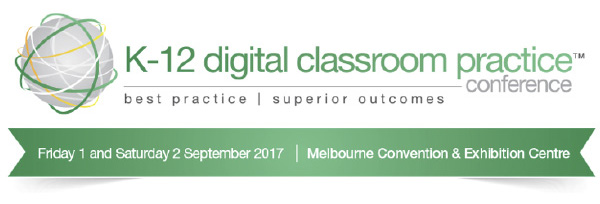K-12 Digital Classroom Practice Conference – that critical infusion
Quality digital classroom practice takes much more than delivering the occasional lesson through an exciting digital technology medium. It is also much more than conducting most of your lessons with routine, low impact digital technology.
What quality digital classroom practice requires is that critical infusion of digital technology in to your teaching most of the time. You need to introduce this quality practice to your teaching, sustain and grow it as new practices emerge.
What are some of the valuable technologies available to you to use in your classroom– taking your teaching and your students’ learning to greater heights?
Here is a snapshot of what the K-12 Digital Classroom Practice Conference offers:
Explore the digital curriculum through a range of practical sessions presented by teachers of digital technology; directors of learning technologies, innovation; and university tutors:
- The ‘forgotten element’ – see how you can introduce the Data and Information strand of the Digital Technologies Curriculum to your students
- In an immersive workshop discover as a learner how connected toys make learning come alive
- See how coding promotes thinking strategies
- Learn how amazing little toys can engage and ignite thinking through discovery and play
- See plenty of innovative examples of pedagogy and practice associated with the digital curriculum
- Discover digital curricula and online resources that offer a wealth of possibilities for extending and reinforcing student language and cultural learning
- Embrace STEAM, (Science, Technology, Engineering, Arts and Maths) in your teaching
- Appreciate how the Maker Movement, Makerspaces, Design Thinking and even the Internet of Things can be included in your teaching programs
- Explore modes of instruction that facilitate differentiation in the classroom
Build your confidence in setting up different digital environments for your students through sessions presented by ICT consultants; heads of e-learning; and directors of technology:
- Upgrade your skills for creating projects in AR (augmented reality) and VR (virtual reality)
- Learn about the pedagogical and curricular benefits of multimodal text creation
- Discuss the merits and challenges of developing and delivering online teaching/learning content using hand-held devices via QR code triggers, image triggers, GPS triggers and VR viewers
- Step out onto the road-less-travelled and try something a little more challenging, especially in 1:1 and BYOD classrooms
- Review research that provides a rich picture into the efficacy of digital technologies and whether they have improved in their effectiveness over time, or whether there is any noticeable return on investment (video, simulation, gaming, computer assisted instruction, flipped learning, etc)
- Learn how to take research-based steps to ensure that digital technologies are used effectively and enhance student performance
Include digital literacies as part of your digital program presented by ICT integrators; teacher librarians; and directors of technology:
- Look at how to teach a progressive set of digital fluencies skills as a continuum across curriculum areas.
- Understand place of social media in schools as an area of Digital Citizenship
- Examine ambitious ways digital and design technologies can be leveraged to improve the practical applications of mathematics and scientific learning
Review some smart digital resources that can help you get your job done, presented by classroom teachers; software and hardware companies; music specialists; science and digital teachers:
- Learn seven essential components students need to be fully empowered to tell digital stories
- Explore practical ways to integrate digital resources appropriate to the needs of your students across the school
- Understand how to run full-class learning activities that allow for every student involved to print a 3D object conveniently
- Explore the potential of digital equipment to make music “beautiful noise” relatively instantly and easily
- Delve into formative response tools and other online applications that you can use to personalize instruction and assessment for the various proficiency levels found in your classrooms
Last but certainly not least attend to your own and your team’s digital professional practice. A range of sessions presented by classroom teachers; digital teachers; and training consultants will give you some great practical ideas:
- Unpack the many features of Hapara Workspace and the way in which it promotes differentiation and learner agency for both the teacher and student
- See how to create and track professional practice strategiesdigitally
- Learn how to reinvent team development through the application of effective digital resources
Learn from your colleagues! Join us on Friday 1 and Saturday 2 September 2017 at the Melbourne Convention & Exhibition Centre (MCEC) to see the amazing ways digital technology can be used in your classroom to deliver the curriculum to your students and to unlock their learning potential.
Leave the conference armed with plenty of information to really push that critical infusion.
Further information can be found at: www.ereg.me/kdcp


Recent Comments
[…] Learn More: Education Technology Solutions […]
[…] The Padagogy Wheel […]
[…] the new reality in the digital environment has compelled websites for schools to change in form. Mal Lee has identified two types of school
[…] (A list of possible interactive activities is available in a companion article “Is your school ready for an LMS? – The Course Design Continuum
[…] How Technology in the Classroom Is Shaping the Future of … […]